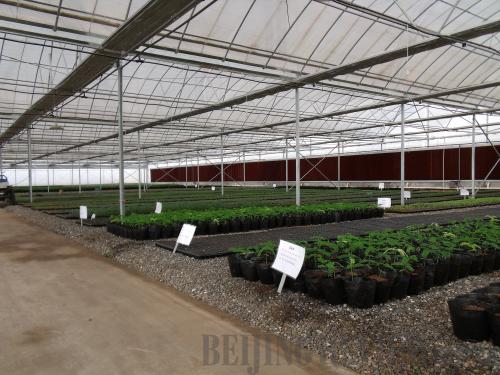|
 |
|
FERTILE: Kingpeng's greenhouse project in Angola (COURTESY OF KINGPENG INT. ) |
Aid to Africa
Aid to Africa has always been a crucial aspect of FOCAC. This year also marks the 60th anniversary of the launch of Chinese aid to foreign countries. For decades, China has been providing its financial and technical assistance to over 120 developing countries.
Medical aid for the prevention and treatment of malaria was one of the eight points laid out by Hu in 2006. During his speech at FOCAC that year, the president pledged that by 2009 China would build 30 hospitals in Africa and provide a grant of 300 million yuan ($44.25 million) for providing Artemisinin (a malaria treatment drug) and build 30 malaria prevention and treatment centers on the continent.
Chen Xianliang, associate chief physician of the Department of Respiratory Medicine in Henan Province People's Hospital, was a member of one of the expert medical teams China dispatched to Africa for this mission. On March 16, 2008, Chen and three other experts from the Center for Disease Control and Prevention in Henan left for Liberia and Uganda for the three-month stint. Their mission was to help install and adjust medical equipment in the local malaria prevention centers established by China, promote malaria testing technology, train staff in malaria treatment and prevention and foster the exchange of knowledge in the field.
"People there were poor and the medical technology was lagging far behind modern standards," Chen recalled. There were about 80 experts in 20 teams. "Experts were sent to different countries in Africa. Our assistance was of great help to local people," he added.
During their stay in Liberia, the experts examined 83 patients suffering from malaria. In Uganda, they performed blood tests on 52 patients, and found that 17.31 percent of those tested positive for falciparum malaria.
Optimistic
Apart from medical aid, the eight measures also brought about the establishment of the China-Africa Development Fund (CADFund). The fund aims to support Chinese companies to develop cooperation with Africa and enter the African market.
Kingpeng is also trying to get financing from CADFund. According to Zhu, the CADFund is helpful, but getting it can be difficult for some companies. "It is in favor of big companies, state-owned in particular. For private and small enterprises, the chances are much lower due to strict qualification requirements. In the future, we hope to see more diverse financing channels available for us smaller businesses," she said.
Besides, technological support is also important in the long run, Zhu said. Based on the pledge made at the Beijing Summit, China has founded 10 agricultural technology demonstration centers in Africa. However, they have not been used efficiently, Zhu noted. "When Chinese experts were there, the centers operated well, but when they left, those centers became inefficient," she said.
In her opinion, a more effective and stable mechanism is vital. She believes an agricultural technology demonstration center could act as an incubation center for the sector, providing constant technological support to Chinese and African companies.
Zhu's worries reflect the challenges along the path of China-Africa cooperation. But last year's FOCAC Summit, held in Egypt, has generated renewed optimism. In the Sharmel Sheikh Action Plan adopted at the forum, the Chinese Government offered to increase the size of the CADFund to $3 billion to support the expansion of investment by Chinese businesses into Africa.
In terms of agriculture, China will increase the number of agricultural technology demonstration centers in Africa to 20, send 50 agricultural technology teams to Africa and train 2,000 African agricultural technicians to strengthen the continent's ability to ensure food security.
"These measures will enable more sustainable and vigorous growth for Africa," Shu Yunguo, Director of the Center for African Studies of Shanghai Normal University, said in an interview with PLA Daily. "The eight new measures are concrete and pragmatic, proving that China-Africa cooperation has entered a new phase of maturity." |